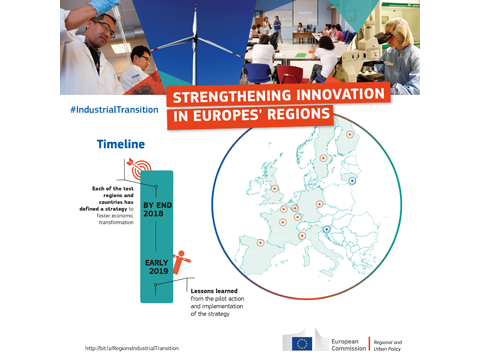The Commission announces which additional industrial transition regions will benefit from tailored support under an EU-funded pilot action. The Commission has selected 7 additional EU regions and Member States for tailored assistance under the pilot call on industrial transition launched in December 2017: Cantabria (Spain), Centre Val de Loire (France), East-North Finland, Grand-Est (France) and Greater Manchester (United Kingdom) as well as Lithuania and Slovenia. They come on top of five regi
- 07 March 2018

The Commission announces which additional industrial transition regions will benefit from tailored support under an EU-funded pilot action.
The Commission has selected 7 additional EU regions and Member States for tailored assistance under the pilot call on industrial transition launched in December 2017: Cantabria (Spain), Centre Val de Loire (France), East-North Finland, Grand-Est (France) and Greater Manchester (United Kingdom) as well as Lithuania and Slovenia. They come on top of five regions already selected in December.
Commissioner for Regional Policy Corina Creţu said: "Industrial transition is a major challenge for our economy and society. We need to find new ways to ensure that everyone everywhere can benefit from the opportunities of innovation and technological change. I am very glad that we will be working with 10 regions and two Member States to help them make full use of their strengths and potentials to embrace innovation, decarbonisation, digitisation, and to develop the skills for the future."
Transforming the regions' economies
The 2 Member States and 5 regions selected today are joining 5 regions that were already selected in December 2017: Hauts-de-France (FR), Norra Mellansverige (North-Middle Sweden), Piemonte (Italy), Saxony (Germany) and Wallonia (Belgium). Given the number of applicants, the Commission had renewed the call of interest to allow more regions to participate.
The selected authorities will be able to develop or redesign strategies for regional economic transformation based on their smart specialisation priorities i.e. the regions' niche areas of competitive strengths. Tailored assistance will be offered by the Commission services, external experts and the Organisation for Economic Co-operation and Development (OECD) to help prepare for the jobs of the future, broaden innovation, support the transition to a low-carbon economy, encourage entrepreneurship and promote inclusive growth.
Up to €200,000 per region is available from the European Regional Development Fund (ERDF) to cover the costs of external expertise that might be needed to support the work of the regions. A grant of maximum €300,000 per region, also from the ERDF, will support the early implementation of their regional economic transformation strategies, subject to sufficient progress in their development.
The strategies for regional transformation should be ready by end of 2018 so that the measures they entail can be implemented as of 2019.
Background
The industrial transition regions pilot action is part of a new set of actions presented by the Commission in July 2017 in its Communication "Strengthening Innovation in Europe's Regions", to reinforce growth and job creation and reduce the Innovation Divide.
These smart specialisation pilot actions reflect a new way for the Commission to work in partnership with regions and Member States and to provide support and expertise under different European policies for cohesion, research and innovation, education and skills and industrial competitiveness. This approach is also outlined in a set of recommendations and accompanying policy paper on Research and innovation and Cohesion policy, published today by the Commission's department for regional and urban policy.
More information
- Factsheet - Pilot action: regions in industrial transition
- Policy Paper - From Rivalry to Synergy: R&I Policy and Cohesion Policy
- Factsheet – what is smart specialisation?
- MEMO – Challenges ahead: boosting innovation-led growth in EU regions
- Communication – Strengthening Innovation in Europe's regions
